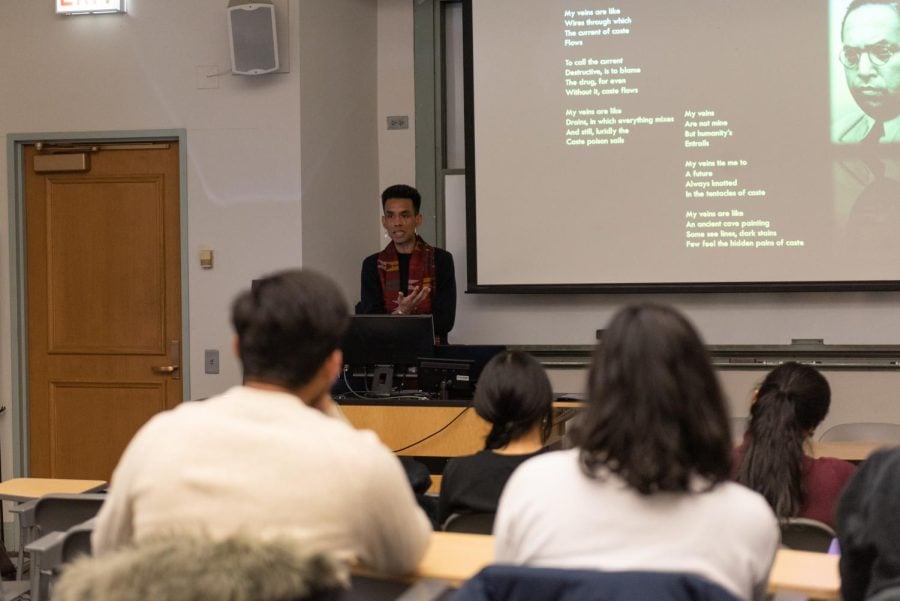Princeton graduate student talks anti-caste futures for Race, Caste and Colorism Project
Katie Chen/The Daily Northwestern
Princeton University anthropology Ph.D. candidate Nikhil Pandhi. He discussed his thesis research about caste and health disparities at a Friday event.
February 5, 2023
Princeton University anthropology Ph.D. candidate Nikhil Pandhi spoke on intersections of anti-caste activism, pain and literature at an event hosted by the Buffett Institute for Global Affairs’ Race, Caste and Colorism Project on Friday.
Pandhi, who is currently writing a dissertation about the connection between caste and health disparities in India, discussed his thesis research and the legacy of Indian politician and civil rights activist B.R. Ambedkar during the talk.
The caste system, Pandhi said, subsists on a system of pain and punishment. He said he is most interested in studying “ordinary” pain.
“The ordinariness of pain … does not destroy language, but its normality from a grammar of words and phrases and gestures, and beckons us towards the grammar of sounds and silences, crying out for the possibility that one’s pain could reside in another’s body,” Pandhi said. “Pain, in this sense, preempts sociality.”
He outlined three degrees of pain that low-caste people endure. He said that first-degree pain covers physical punishments, second-degree refers to poor living conditions and enslavement and third-degree pain relates to the socialization of caste.
Pandhi dedicated his talk to the many people who have discussed their experiences of caste with him — several of whom he said would be dangerous to name given the “stakes of structural casteism in India.”
“To my interlocutors, your stories are the reason I’m drawn to doing the discordant anthropology that is literature,” Pandhi said. “Your stories give me hope that there are myriad ways of manipulating caste.”
Pandhi said listening to stories of pain is one way to combat casteism.
He also translated several works from Hindi to English for his Friday talk, including writings by contemporary South Asian poets and Ambedkar himself.
Asian languages and cultures Prof. Laura Brueck said Pandhi combines his skills as an ethnographer, translator and literary scholar to research health and medicine in India.
“Nikhil ethnographically investigates how caste becomes chronic as a determinant of individual and communitywide health disparities,” Brueck said.
Following his talk at University Hall, Pandhi led a Saturday workshop on translating South Asian literary texts at the Haymarket House in Chicago. Participants translated and discussed “Bhaichara,” a Dalit feminist story by author Rajat Rani Meenu, during Saturday’s workshop.
Second-year comparative literary studies Ph.D. student Soumya Shailendra organized the Saturday translation workshop and attended the Friday talk. Shailendra said she appreciated the interdisciplinary nature of Pandhi’s research, from his references to Black feminist thought to his work between different academic fields.
“Nikhil is working between two departments and two disciplines that don’t necessarily always talk to each other — that is anthropology and literature,” Shailendra said. “But, Nikhil’s way of engaging both of these disciplines is to actually pay attention to the way they’ve pulled into the lives and the challenges of oppressed communities.”
Email: [email protected]
Twitter: @rjleung7
Email: [email protected]
Twitter: @maiapandey
Related Stories:
— Harvard researcher and NU profs. discuss Black and Dalit solidarity
— APAC fall speaker Samip Mallick emphasizes importance of South Asian and Black solidarity
— Hari Kondabolu talks South Asian representation in the arts


